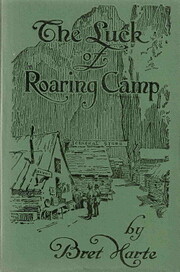

Click on a thumbnail to go to Google Books.
|
Loading... The Luck of Roaring Camp and Other Sketchesby Bret Harte"The Luck of Roaring Camp" is a short story first published in the August 1868 issue of the Overland Monthly and helped push Harte to international prominence. The story is about the birth of a baby boy in a 19th-century gold prospecting camp. The boy's mother, Cherokee Sal, dies in childbirth, so the men of Roaring Camp must raise it themselves. Believing the child to be a good luck charm, the miners christen the boy Thomas Luck. Afterwards, they decide to refine their behavior and refrain from gambling and fighting. At the end of the story, however, Luck and a villager, Kentuck, perish in a flash flood that strikes the camp. Roaring Camp was a real place. It was a goldmining settlement on the Mokelumne River in Amador County, California. It was home to forty-niners seeking gold in and around the river; it is now a privately owned tourist attraction. The story's flood theme may have been inspired by California's Great Flood of 1862, which Harte witnessed. The story takes place in a small struggling mining town located in the foothills of the California mountains at the time of the gold rush. The camp is suffering from a long string of bad luck. With only one woman in their midst, it seems as though the miners have no future. However, the tide turns when a small boy is born. "Thomas Luck" is the first newborn the camp has seen in ages; things are looking up. The miners become cheerful, foliage begins to grow, and there is talk of building a hotel to attract outsiders. Unfortunately, the hope is wiped out by the sudden death of Luck in a flood. Water brought gold to the gulches, giving miners their first glimmer of hope. And water takes away what seems their last glimmer—Luck. Bret Harte and his colleague Anton Roman at the Overland Monthly were in Santa Cruz, California when "The Luck of Roaring Camp" was set in type in the summer of 1868. The proofreader in their absence, Sarah B. Cooper, objected to some of the content in the story. She particularly disliked the use of a prostitute character and the expletives spoken by the miners. Cooper brought her concerns to the printer, who agreed with her, and contacted Roman, the owner. He began to worry about potential controversy over the story's morality and the harm it would cause to the new Overland Monthly in its second issue. Roman later claimed he supported Harte from the beginning, but that Harte was willing to make the editorial changes without question until Roman's wife read the tale and approved of it. Harte called those claims "lies" in 1879. Fellow Overland contributor Ina Coolbrith recalled there was a confrontation between the two at the time and that Harte threatened to resign. "The Luck of Roaring Camp" was soon included as the centerpiece of Harte's collection The Luck of Roaring Camp and Other Sketches. The compilation was published by James Thomas Fields of Fields, Osgood, & Co. at about the same time that Harte's poem "The Heathen Chinee" was published. Those simultaneous publications caused Harte's popularity to skyrocket nearly overnight and Fields offered Harte a $10,000 exclusive contract to contribute to The Atlantic Monthly. After the collection's publication April 1870, Fields rushed a compilation of Harte's poetry for the Christmas market to capitalize on the success of "The Heathen Chinee". Local presses in California were unimpressed by "The Luck of Roaring Camp". The Alta California, for example, described simply as "a pleasant little sketch". Publications closer to the east coast, however, soon raised the story's popularity. The Springfield Republican called it "a genuine California story" that was "so true to nature and so deep-reaching in its humor, that it will move the hearts of men everywhere". Mark Twain wrote in the Buffalo Express that it was "the best prose magazine article that has seen the light for many months on either side of the ocean". It was only after these endorsements that "The Luck of Roaring Camp" found a strong audience in California. Zamorano 40, BAL 7247, Grolier 76, Baird-Greenwood 1104, Merle Johnson High Spot. |
Current DiscussionsNonePopular covers
 Google Books — Loading... Google Books — Loading...GenresMelvil Decimal System (DDC)813.4Literature American literature in English American fiction in English Later 19th Century 1861-1900LC ClassificationRatingAverage: (3.38) (3.38)
Is this you?Become a LibraryThing Author. |